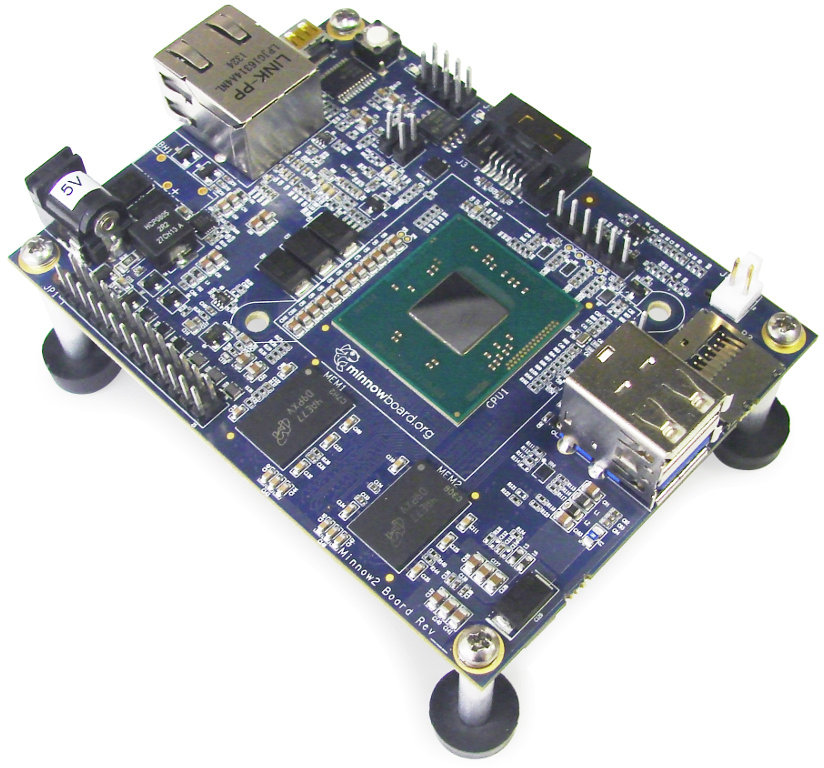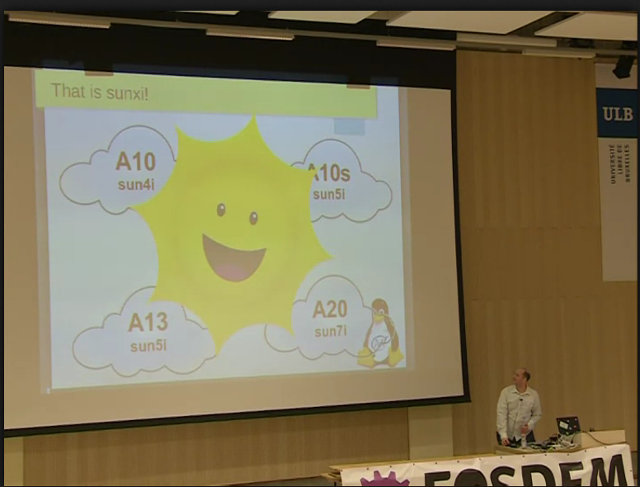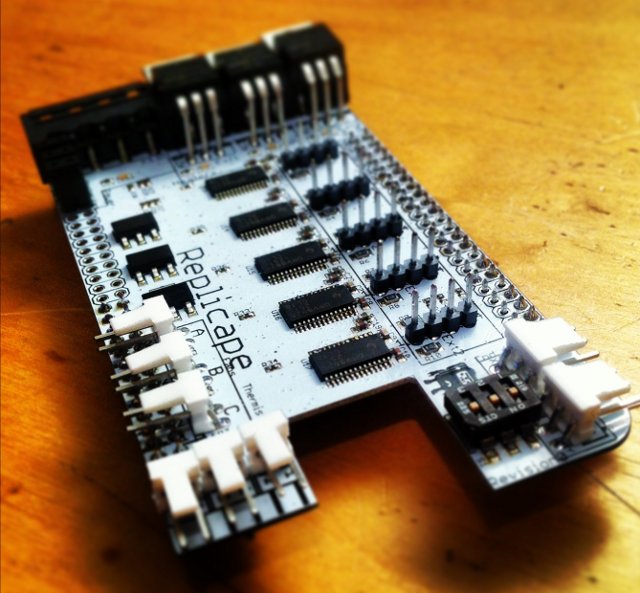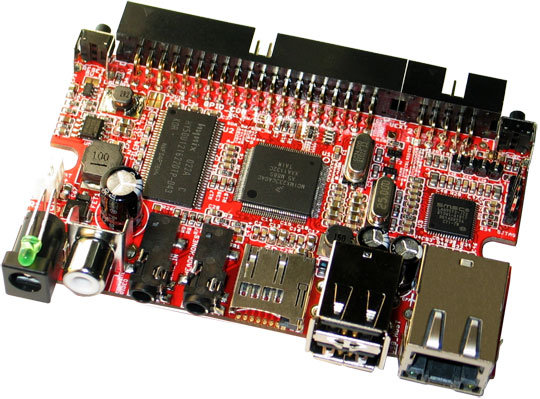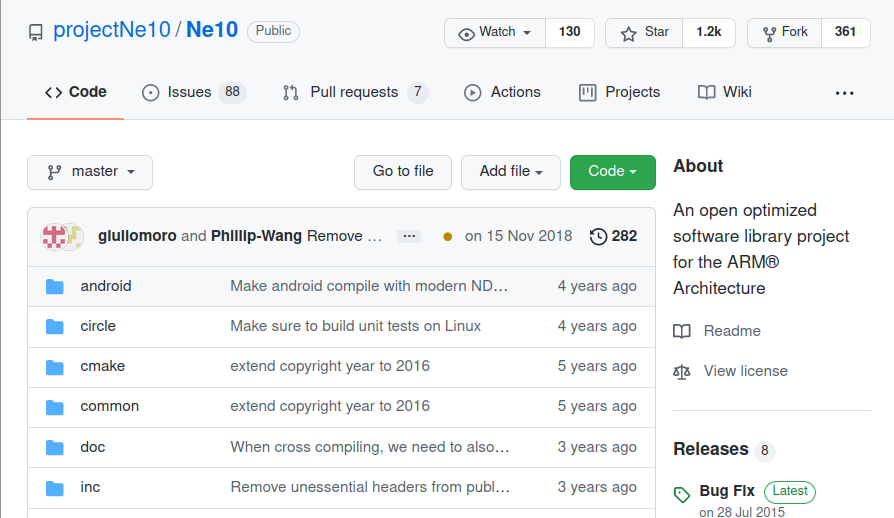When Intel released the original MinnowBoard which was a step in the right direction, but there were some complains, as the company had chosen to use an older Intel processor, and the price was much higher than most high performance low cost ARM development boards. MinnowBoard MAX (aka Minnow2 Board) fixes all that, as it features the latest Intel Bay Trail-I (E3800 series) processor, and costs as low as $99 for the single core version, and $129 for the dual core version. Let’s jump directly to the specifications: SoC – 64-bit Intel Atom E3815 (single-core, 1.46 GHz) or Atom E3825 (dual-core, 1.33 GHz) both with integrated Intel HD Graphics coming with Open Source hardware-accelerated drivers for Linux OS System Memory – 1GB ($99 model) or 2GB ($129 model) DDR3 RAM Storage – 1x Micro SD card slot, 1x SATA2 3Gb/sec, 8 MB SPI Flash for firmware (UEFI) Video Output – micro […]
AllWinner Linux-sunxi Community Presentation and Status Report – FOSDEM 2014
Oliver Schinagl, a member of linux-sunxi community working on open source kernel and bootloader for AllWinner SoCs, has given a presentation of the community at FOSDEM 2014 to give an overview, and show what progress has been made to date. I’ll write a summary in this post, but if you want to watch the video and/or access the slides scroll down at the bottom of the post. After explaining what sunxi is, and introducing himself, he gave some information about AllWinner and their SoCs: Founded in 2007 in Zhuhai, Chiang now with 550 employees including 450+ engineers 15% market share in 2013 for tablet SoCs, only behind Apple. Products: F-series SoC (2010), A10 (2011), A13, A10s (2012), and A20 (2013). (cnsoft He skipped A31(s) and A80 here as they are not really supported by the community). They list “Open Source Source” and “GPLv3” in their marketing materials although they clearly […]
Replicate CAPE Adds 3D Printring Capability to the Beaglebone
Beagleboard.org launched the Beaglebone Cape Design Contest back in November, several designs were submitted, and yesterday, they announced the 3 winning CAPEs who will be manufactured and sold by Circuitco Electronics: Replicape by Elias Bakken – 3D printer cape Interacto by Chris Clark – Cape with a triple axis accelerometer,a gyroscope, a magnetometer and a 640×480 30fps camera. Geiger cape by Matt Ranostay – Geiger counter cape Since today I’ve started to write about 3D printing, let’s carry on and have a closer look at the Replicape. The Replicape 3D printer cape includes: 5 stepper motors (X, Y, Z, Ext1, Ext2) 3 high power MOSFETs (PWM controlled) for 2 extruders and 1 HPB 3 medium power MOSFETs (PWM controlled) for up to 3 fans 3 analog input ports for thermistors 3 inputs for end stops (X, Y, Z) Programmable current limits on steppers motor drivers (SMD). No need to manually adjust […]
Telechips Releases Linux Kernel 3.0.8 and Android ICS Source Code
Telechips has just uploaded the GPL source code for kernel 3.0.8 and Android 4.0 to the open source section of their website. If downloading from telechips website is too slow, you can also try alternate downloads (Thanks Gabe!): Kernel-3.0.8.tar.gz Ics.tar.gz I’ve also created 2 repositories in github: telechips-linux – Linux kernel source code telechips-android – Android platform open source code (webkit + OpenMAX source code) It haven’t looked into the source code in details yet, but hopefully, this will allow developers to customize the firmware running on Telechips TCC8925 based mini PCs such as CX-01 mini Android TV Box or Zero Devices Z900. Jean-Luc Aufranc (CNXSoft)Jean-Luc started CNX Software in 2010 as a part-time endeavor, before quitting his job as a software engineering manager, and starting to write daily news, and reviews full time later in 2011. www.cnx-software.com
30 Euros Olimex iMX233-OLinuXino Linux Development Board
Olimex announced the first 10 prototypes of OLinuXino development board. Started in March of this year, OLinuXino is a development board based on Freescale i.MX233 aiming to provide a low cost (30 Euros) open source hardware and software single board computer to run Linux. Here are the specifications of OLinuXino single board computer: Freescale iMX233 454Mhz ARM9 processor 64MB of RAM Linux bootable image from SD-CARD TV-Video Output USB host for Keyboard, camera, WiFi, etc interfacing UEXT connector and GPIO connectors with the same style as DuinoMite so that developers can add external modules supporting Zigbee, Bluetooth, RFID readers, relays, switches, sensors, etc… The company also plans to provide 2 plug-in modules for this board: iMX-LCD – a 4.3″ TFT 24 bit color LCD with touchscreen (EUR 30) MX-HUB – A board adding 2 USB hosts and Ethernet (EUR 15) [Update: The company will actually make 2 versions of this […]
ARM Releases Ne10: An Open Source Library with NEON Optimized Functions
The Advanced SIMD extension (aka NEON or “MPE” Media Processing Engine) is a combined 64- and 128-bit single instruction multiple data (SIMD) instruction set that provides standardized acceleration for media and signal processing applications for ARM Cortex-A (ARMv7) processors and the goal of these instructions is similar to MMX, SSE, and 3DNow! extensions for x86 processors. Starting early 2011, ARM has been working internally on a project codenamed Snappy to develop common functions accelerated by NEON. They have now released the first version of Snappy, now called the Ne10 library, which is available on GitHub at https://github.com/projectNe10/Ne10 . The code has been developed in C and Assembler and tested on Ubuntu on ARM (Linaro). A Makefile is also included to build it for Android (AOSP). The current functions include vector and matrix operations accelerated by NEON instructions. Since the library is open source, ARM hopes developers will make use of the Ne10 […]
The Power of SPDX (Software Package Data Exchange) – ELC 2012
Mark Gisi, Sr. Manager of Intellectual Property at Wind River , discusses SPDX (Software Package Data Exchange) at Embedded Linux Conference 2012. Abstract: Sharing Critical Licensing Information within a Linux Device Supply Chain Embedded Linux device runtimes are derived from 100s of open source packages. A common misunderstanding is that just one or two licenses govern a given open source package, when in fact; often a dozen or more apply. Therefore a device runtime could be under 100s of unique licenses. Determining which licenses are relevant is challenging. SPDX, the Linux Foundation’s license exchange format, provides an effective mechanism for recording and sharing licensing information within a device vendor supply chain. We present an overview of SPDX along with a detailed source code example on how to create and extract relevant licensing information. The target audience includes developers, engineering managers, release operation engineers and license compliance professionals. They will learn […]
Embedded World Conference 2012 Schedule
The Embedded World Conference 2012 will taken place on the February 28 – March 1 in Nuremberg, Germany. There will be over 1,000 exhibitors for the tenth conference (it started in 2003) showcasing their new products and solutions for the embedded markets. Beyond the exhibition, there will also be 13 classes and 22 sessions during those 3 days. February 28th 2012 Classes: 09:30 – 15:30 – Modeling Behavior with UML: Interactions and Statecharts by Dr. Bruce Douglass, IBM 16:00 – 17:00 – Agile Systems Engineering by Dr. Bruce Douglass, IBM 09:30 – 18:00 – Introduction to Real-Time Operating Systems by Dr. David Kalinsky, D. Kalinsky Associates 09:30 – 18:00 – Hands-on-Workshop Safety Critical Linux – Automated debugging and code screening with formal methods by Prof. Nicholas Mc Guire, OSADL Safety Critical Linux Working Group and Andreas Platschek, OpenTech. 09:30 – 16:30 – Cryptography and embedded Security – The Workshop chaired […]


